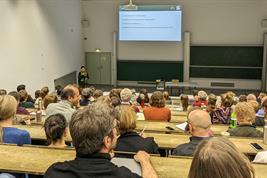15.03.2024

Can the joint work of practitioners and researchers in living laboratories accelerate and improve the transformation of the agriculture and food sector, and if so, how? Questions like these were discussed by more than 100 participants at a pre-conference for the Scientific Conference on Organic Agriculture (Wita 2024) at the University of Giessen. The event was organized by the Hessian Research Association for Agricultural Systems Ecology - a consortium of the University of Kassel, the Justus Liebig University Giessen and the University of Applied Sciences Geisenheim - and the Leibniz Centre for Agricultural Landscape Research (ZALF) in Müncheberg, Brandenburg.
Advancing transformation processes in living laboratories is a new approach to research at eye level between policymakers, practitioners, civil society, and academia. The basic principle: research questions and possible solutions are developed in a collaborative process by stakeholders and researchers, and innovations are developed and evaluated together. In this way, learning environments for experimental innovation research emerge in landscapes that are equally shaped by scientific and many non-scientific actors. Agricultural living labs, which are currently on the rise nationally and across Europe, are designed for the long term and are largely managed by non-scientific stakeholders.
Together with the three Hessian agricultural universities in Kassel, Giessen and Geisenheim, ZALF has developed a concept for living laboratory work in a planned Brandenburg-Hessian Innovation Center for Agricultural System Transformation (IAT), which is currently being evaluated by the German Science Council. Professor Dr. Bettina Matzdorf, Co-Head of the Research Area "Land Use and Governance" at ZALF in Müncheberg, presented this concept. Dr. Oskar Marg from the Institute for Social-Ecological Research (ISOE) in Frankfurt summarized his experiences from accompanying research in living laboratories. This was followed by a World Café with six different thematic tables:
-
Participatory approaches in agricultural and food research:The success factors identified by the participants included trust-based collaboration on an equal footing, rewarding the work of those involved in agricultural practice, good processing of results and independent coordination.
-
Allocation of roles in the living lab: The work should not be led by the scientific side. An external, independent coordinating and moderating role and a lack of hierarchical structure are important, clear rules are helpful.
-
Living laboratory work in studies and scientific careers: Learning in living laboratories during studies provides valuable experience that can be helpful and sought after in practice-oriented research professions. However, for traditional research professions, where publications are important criteria for success, the relatively time-consuming work with stakeholders is still an obstacle. New evaluation criteria need to be developed to make living lab work more attractive, especially for young researchers.
-
Methods and concepts for practice-relevant and scientifically significant research: An integrative systems view can enable the linking of agricultural and food systems in a pre-competitive experimental space and beyond established solutions. Professional knowledge management inside and outside the laboratories is key.
-
Motivation of stakeholders in practice, society, politics and science: The approach is successful through multipliers and networks, by searching for blind spots and a topic that is relevant to as many people as possible. They stay on board by creating an individual benefit.
-
Practical relevance for sustainable change: Both basic and applied research are needed. Their interests may differ, but collaboration is successful if a common understanding is established from the outset.
Moderator Prof. Dr. Eckhard Jedicke, head of the Competence Center Cultural Landscapes at the University of Applied Sciences in Geisenheim, noted the great need for discussion and creative exchange: Work in living labs is seen in the agricultural and food industry as a valuable way to bring land use practice and actors in the value chains, social and natural sciences, politics and society onto a common path towards sustainable transformation. The conference is expected to produce a thematic paper that will serve as a basis for further exchange.
